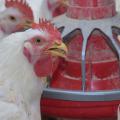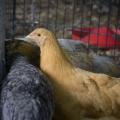Causes for hens eating their eggs
The causes that incite hens to eat their eggs usually result because of poor husbandry or management practices. Chickens do not naturally eat their eggs. Once the management of the flock is restored to an acceptable state, the egg eating will stop. The list of major causes and corrections are listed below.
- If shells of the eggs are thin and weak, provide proper diets as discussed in the nutrition section to correct the problem.
- Not enough nest space is provided. Provide at least one standard nest for each four hens.
- Keep plenty of soft nesting material in the nest so eggs will have a cushion on which to lay.
- Collect the eggs more regularly, at least 2 or 3 times daily. The longer the eggs remain in the nest, the greater chance of breakage and consumption.
- Provide plenty of clean, fresh drinking water. Hens need greater amounts of water than other birds and may consume their eggs for the liquid content.
- Cull non-laying hens from the flock. Refer to Culling Hens for assistance with this process.
- Maintain a disease-free flock that is treated regularly for internal and external parasites.
Publications
News
STARKVILLE, Miss. -- Until an avian flu vaccine for chickens or other alternative is federally approved, commercial poultry operations in the U.S.
STARKVILLE, Miss. -- If egg prices have seemed higher than ever lately, it’s because they are, and consumers can place much of the blame squarely at the feet of the ongoing bird flu outbreak.
With highly pathogenic avian influenza, or HPAI, in the environment in Mississippi, owners of backyard flocks have to take extra steps to keep their chickens healthy.
Avian influenza poses an extremely low risk to human health and none to food safety in Mississippi, but its presence poses a risk to backyard flocks and the state’s $3 billion commercial poultry industry.






